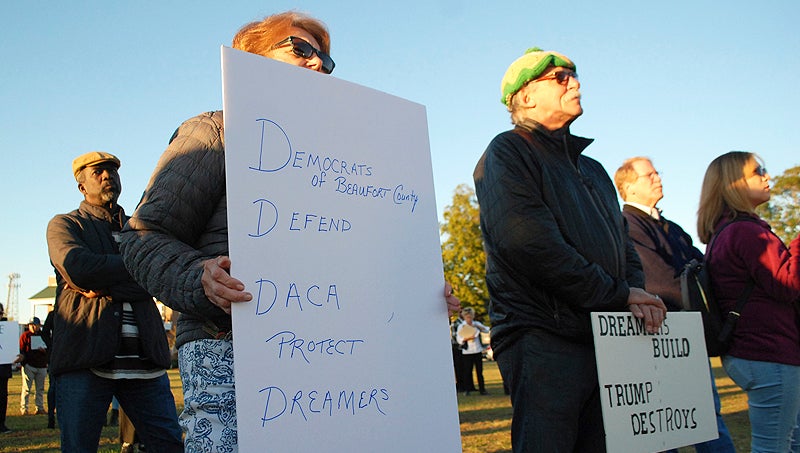DACA supporters gather at Festival Park
Published 5:42 pm Tuesday, October 31, 2017

- SHOW OF SUPPORT: A crowd of roughly 100 residents came out to Festival Park as a show of support for DACA recipients. Beaufort County Indivisible and the Association of Mexicans in North Carolina organized the rally. (Caroline Hudson/Daily News)
“Nothing makes me feel more impotent than hearing, ‘Lo siento, mija. You can’t do that because we don’t have papers,’” 25-year-old Carolina Vega said.
Vega is a student at Beaufort County Community College who moved to the U.S. at the age of 6.
As she grew older, Vega said she felt the effects of her illegal status more and more. She was unable to sign up for driver’s education classes, and instead of securing a summer job at a grocery store like many of her peers, she worked 10- to 12-hour days in a tobacco field.
Beaufort County Indivisible, a progressive group, hosted a rally in conjunction with the Association of Mexicans in North Carolina at Festival Park Monday as a show of support for the Deferred Action for Childhood Arrivals program, which gives undocumented immigrants who entered the country before age 16 and have been living in the United States since June 15, 2007, the option for two-year deportation deferrals.
Vega is one of those DACA recipients.
Every two years, those eligible were required to reapply for the DACA program, which was instated by former President Barack Obama in 2012. In early September, President Donald Trump announced an end to the DACA program, leaving many undocumented immigrants in a wave of uncertainty.
The Trump administration’s announcement to end DACA sparked waves of rallies and protests in defense of the program, including Monday’s rally in Washington.
“The rescinding of DACA by the current administration, in my opinion, flies in the face of the commandments of Jesus. The rescinding of DACA sends a message to those of us fortunate enough to have been born in this country that there isn’t enough to go around,” said Janet Rodman, an English as a Second Language teacher for Beaufort County Schools.
“The rescinding of DACA creates the mindset that our lives would be much better off if only those 800,000 young people would be gone —just pack up and go home, wherever home may be.”
Rodman said American citizens should be willing to help the DACA recipients, commonly known as Dreamers, as Jesus commanded his followers to love their neighbors.
“It will only harm hundreds of thousands of people, Dreamers and their families, by sending them underground or back to countries that are now actually foreign to them,” Rodman said.
However, supporters of the DACA repeal have said the program’s instatement via executive order was unconstitutional from the start.
Since 2001, the U.S. Congress has debated and failed to pass some version of the DREAM Act, or Development, Relief, and Education for Alien Minors, which is similar to the DACA program. No headway on the matter is part of the reason Obama chose to issue an executive order.
Other supporters of the program’s rescission argue the DACA program is simply a short-term solution and does not outline a future in the U.S. for recipients.
The Trump administration is allowing Congress a six-month period to come up with a replacement for DACA, so yet another version of the DREAM Act is back on the table. Also on the docket for discussion is the Recognizing America’s Children Act, which would also provide a “conditional permanent resident” status for those eligible.
One in 5 Americans are in favor of deporting young immigrants brought to the United States as children and now here illegally, according to a report from The Associated Press-NORC Center for Public Affairs Research. There are about 800,000 DACA recipients nationwide, and more than 27,000 in North Carolina.
“We were faced with two options: wind the program down in an orderly fashion that protects beneficiaries in the near-term while working with Congress to pass legislation; or allow the judiciary to potentially shut the program down completely and immediately. The Administration chose the least disruptive option,” Homeland Security Secretary Elaine Duke wrote in a statement earlier this year.
Vega said she was only able to attend college and secure a job working at an assembly line after Obama drafted the executive order for DACA. She said she will graduate this semester with three associate degrees, but her future beyond that is now uncertain.
“All we ask for is an opportunity to freely be a part of this country, in which many of us have been raised from a young age,” Vega said. “I know I am not from here, but that does not mean I do not belong here. … I have built a life here, and I feel like I am a part of this community.”





